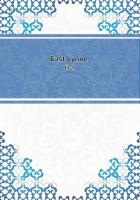Nevertheless, Monsieur de Bonfons (he had finally abolished his patronymic of Cruchot) did not realize any of his ambitious ideas. He died eight days after his election as deputy of Saumur. God, who sees all and never strikes amiss, punished him, no doubt, for his sordid calculations and the legal cleverness with which, /accurante Cruchot/, he had drawn up his marriage contract, in which husband and wife gave to each other, "in case they should have no children, their entire property of every kind, landed or otherwise, without exception or reservation, dispensing even with the formality of an inventory;provided that said omission of said inventory shall not injure their heirs and assigns, it being understood that this deed of gift is, etc., etc." This clause of the contract will explain the profound respect which monsieur le president always testified for the wishes, and above all, for the solitude of Madame de Bonfons. Women cited him as the most considerate and delicate of men, pitied him, and even went so far as to find fault with the passion and grief of Eugenie, blaming her, as women know so well how to blame, with cruel but discreet insinuation.
"Madame de Bonfons must be very ill to leave her husband entirely alone. Poor woman! Is she likely to get well? What is it? Something gastric? A cancer?"--"She has grown perfectly yellow. She ought to consult some celebrated doctor in Paris."--"How can she be happy without a child? They say she loves her husband; then why not give him an heir?--in his position, too!"--"Do you know, it is really dreadful!
If it is the result of mere caprice, it is unpardonable. Poor president!"Endowed with the delicate perception which a solitary soul acquires through constant meditation, through the exquisite clear-sightedness with which a mind aloof from life fastens on all that falls within its sphere, Eugenie, taught by suffering and by her later education to divine thought, knew well that the president desired her death that he might step into possession of their immense fortune, augmented by the property of his uncle the notary and his uncle the abbe, whom it had lately pleased God to call to himself. The poor solitary pitied the president. Providence avenged her for the calculations and the indifference of a husband who respected the hopeless passion on which she spent her life because it was his surest safeguard. To give life to a child would give death to his hopes,--the hopes of selfishness, the joys of ambition, which the president cherished as he looked into the future.
God thus flung piles of gold upon this prisoner to whom gold was a matter of indifference, who longed for heaven, who lived, pious and good, in holy thoughts, succoring the unfortunate in secret, and never wearying of such deeds. Madame de Bonfons became a widow at thirty-six. She is still beautiful, but with the beauty of a woman who is nearly forty years of age. Her face is white and placid and calm; her voice gentle and self-possessed; her manners are ******. She has the noblest qualities of sorrow, the saintliness of one who has never soiled her soul by contact with the world; but she has also the rigid bearing of an old maid and the petty habits inseparable from the narrow round of provincial life. In spite of her vast wealth, she lives as the poor Eugenie Grandet once lived. The fire is never lighted on her hearth until the day when her father allowed it to be lighted in the hall, and it is put out in conformity with the rules which governed her youthful years. She dresses as her mother dressed.
The house in Saumur, without sun, without warmth, always in shadow, melancholy, is an image of her life. She carefully accumulates her income, and might seem parsimonious did she not disarm criticism by a noble employment of her wealth. Pious and charitable institutions, a hospital for old age, Christian schools for children, a public library richly endowed, bear testimony against the charge of avarice which some persons lay at her door. The churches of Saumur owe much of their embellishment to her. Madame de Bonfons (sometimes ironically spoken of as mademoiselle) inspires for the most part reverential respect: and yet that noble heart, beating only with tenderest emotions, has been, from first to last, subjected to the calculations of human selfishness; money has cast its frigid influence upon that hallowed life and taught distrust of feelings to a woman who is all feeling.
"I have none but you to love me," she says to Nanon.
The hand of this woman stanches the secret wounds in many families.
She goes on her way to heaven attended by a train of benefactions. The grandeur of her soul redeems the narrowness of her education and the petty habits of her early life.
Such is the history of Eugenie Grandet, who is in the world but not of it; who, created to be supremely a wife and mother, has neither husband nor children nor family. Lately there has been some question of her marrying again. The Saumur people talk of her and of the Marquis de Froidfond, whose family are beginning to beset the rich widow just as, in former days, the Cruchots laid siege to the rich heiress. Nanon and Cornoiller are, it is said, in the interests of the marquis. Nothing could be more false. Neither la Grande Nanon nor Cornoiller has sufficient mind to understand the corruptions of the world.














